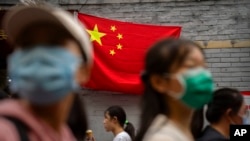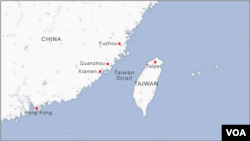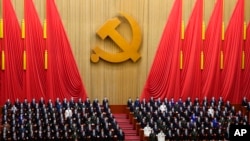Chinese President Xi Jinping’s success in securing an unprecedented third term this weekend has fueled speculation on whether he will try to forcefully reunify with Taiwan — the self-ruled island seen by Beijing as a part of China — in the next few years.
Some analysts speculate that China will try to achieve unification by 2049, the 100th anniversary of the founding of the People’s Republic of China. A U.S. Navy official, meanwhile, has warned that Xi may attempt to take back Taiwan by 2027, the People’s Liberation Army’s (PLA) 100th birthday. And a Taiwanese official this week said Beijing could coerce Taiwan into accepting unfavorable terms for unification as early as next year.
Partly fueling the speculation is that Xi, the strongest leader China has had in years, has often called for achieving China’s “rejuvenation,” which includes reunifying with Taiwan.
However, Xi has not mentioned a timeline, at least not publicly. And he offered no clues during his opening speech at the 20th party congress last weekend.
He said the same things he had said before, but emphasized that faced with “gross provocations of external (U.S.) interference in Taiwan affairs,” China will continue to “strive for peaceful reunification with the greatest sincerity and the utmost effort,” but “will never promise to renounce the use of force, and we reserve the option of taking all measures necessary.”
Analysts differ in their assessments of Xi’s intentions.
Chang Wu-yue, director of Taiwan’s Tamkang University Cross-Strait Relations Research Center, says Xi will not try to unify in the next five years because “the cost will be high.”
“Beijing’s current plan is to achieve unification no later than 2049,” Chang said.
By then, Xi would be 96 years old, so it’s unclear whether it’s his plan or China’s plan, or if there’s even a plan.
Simon Chen, a political science professor at National Taiwan University, says there’s a sense of urgency in Xi’s speech.
“In 2019, he said the reunification issue cannot be delayed from one generation to another, but this year, he said unification of the nation must be achieved and can definitely be achieved,” Chen said.
At the end of the party congress Saturday, the Communist Party also approved an amendment to its charter opposing Taiwan independence for the first time.
Tensions between Beijing and Taipei have risen in recent years, further fueling speculation of an impending attack.
From 2008-16 when Taiwan’s former ruling party the Kuomintang (KMT) was in power, relations between Beijing and Taipei reached their best level since the end of the civil war in 1949, but they quickly deteriorated to the worst in decades after President Tsai Ing-wen from Taiwan’s pro-independence Democratic Progressive Party (DPP) came to power in 2016 and U.S. President Donald Trump took office a year later.
Tsai refused to accept a compromise agreement previously accepted by both sides, which allowed them to put aside the touchy issue of Taiwan’s sovereignty and reduce tensions. Under the agreement, called the ‘92 Consensus, both sides agreed there is only one China, with the KMT interpreting that to mean each side can define what that China is — the Republic of China (Taiwan’s official name) or the People’s Republic of China.
Tsai and her party have argued that the agreement was not written down, and Beijing has never accepted the KMT’s interpretation. But China’s leaders also have never publicly rejected it, leaving room for the two sides to work together.
At the heart of the matter is that the DPP and its supporters don’t want Taiwan and the mainland to be part of one China, regardless of how it’s defined. They prefer to work toward achieving international treatment and inclusion of Taiwan just like other countries get, even if it’s not officially recognized as one.
Analysts say even though Beijing doesn’t want to go to war to reunify the two sides, it may feel forced to do so if the current trend of U.S.-Taiwan relations continues.
Under former President Donald Trump and now President Biden, the U.S. has sold more weapons to Taiwan in six years than former President Barack Obama did in his eight years in office.
There have also been numerous visits from high-level U.S. officials to Taiwan, including by House Speaker Nancy Pelosi in August. And U.S. lawmakers from both parties are on the verge of passing yet another pro-Taiwan act.
The Taiwan Policy Act, while considered necessary by U.S. lawmakers seeking to support Taiwan, is alarming to Beijing. According to the Senate’s website, it aims to bolster Taiwan’s defense capabilities, providing almost $4.5 billion in security assistance to Taiwan, and designates Taipei as a “Major Non-NATO Ally.” It also obligates U.S. administrations to promote Taiwan’s participation in international organizations, and to set up a sanctions regime to “deter further PRC aggression against Taiwan.”
Victor Gao, a Beijing-based scholar who understands the Chinese leadership’s mindset, says Xi has no timeline, prefers peaceful unification and can “wait a millennium” for it to happen, but actions such as passage of the Taiwan Policy Act, will break Sino-U.S. agreements and cross Beijing’s red line, leaving China no choice but to break off diplomatic ties with the U.S. and/or take Taiwan by force to protect its sovereignty.
“The ball right now is in Washington, D.C.’s court. If Washington doesn’t promote the independence of Taiwan and if Tsai Ing-wen doesn't push for independence, the status quo can last a millennium. There's no rush. Why rush?” said Gao, vice president of the research group Center for China and Globalization.
But he says if the U.S. takes actions that violate the “One China” policy and Sino-U.S. agreements, it will trigger a war that will devastate both sides.
“Some 1,500 kilometers of coastal area in China is fully covered with missiles. If the U.S. (in coming to Taiwan’s defense) bombs Chinese coastal cities and Beijing, do you think anywhere in the U.S., such as New York and Washington, D.C., will be safe?” Gao asked.
He warned when Xi said China will take “all measures necessary,” it means it could use nuclear weapons.
“In a nuclear age, if one country tries to attack another, there will be mutually assured destruction, that country will be destroyed at the same time,” Gao said, adding that all sides should therefore “promote peace in cross-strait relations, not war.”










